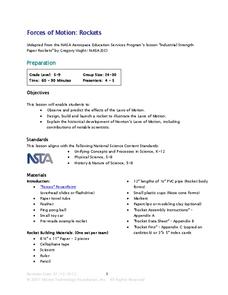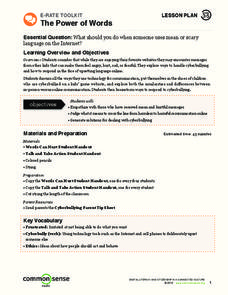MENSA Education & Research Foundation
Magical Musical Tour: Using Lyrics to Teach Literary Elements
Language arts learners don't need a lecture about poetry; they listen to poetry every day on the radio! Apply skills from literary analysis to famous songs and beautiful lyrics with a instructional activity about literary devices. As...
National Math + Science Initative
Introduction to Decimals
Three activities make up an introductory lesson designed to create a strong foundation in comparing fractions to decimals and exploring and building decimal models. Pupils brainstorm and complete a Venn diagram to show how decimals and...
ReadWriteThink
Literature Circles: Getting Started
Make reading more enjoyable and interactive with literature circles! Here you'll find detailed lessons to begin the literature circle process. Ten lessons introduce each role learners take on. Literature circle roles include...
Habits of Mind
Haileybury Habits of Mind Learning Resource Book
Imagine a learning community committed to using Costa and Kallick's Habits of Mind as the basis of curriculum design. The resource book is packed with lessons that are designed for and identify the standards and habits of mind targeted...
Safe Drinking Water Foundation
Water Bottles Everywhere
Young environmentalists examine how water bottle use is polluting the waters on our earth. In groups, your students study the handout on their assigned topic and present their findings to the rest of the class. Leading up to this lesson,...
Safe Drinking Water Foundation
Demonstration of Water Pollution
In this teacher-led demonstration, your young environmentalists will observe and record how different types of water pollutants look when they are combined. From here, individuals will develop a hypothesis on how the water can be...
Safe Drinking Water Foundation
How Water Pollution Is Cleaned Up
As a follow-up from the previous lesson, young environmentalists discuss the benefits of water filtration and whether or not it's the best option. Other alternatives including air stripping, bioremediation, and phytoremediation are...
Safe Drinking Water Foundation
Make Your Own Water Pollution
Using the polluted water that was made in the prior lesson, your young environmentalists will mix pollutants together in an experiment. Then, they will design a water filter that will clean the polluted water to use in the next lesson....
Safe Drinking Water Foundation
Cause and Effect of Water Pollution
Your students will become aware of and be able to list the major types and sources of water pollution. Being able to recognize that the household, agriculture, and industry sectors of society contribute to water pollution, is the main...
Safe Drinking Water Foundation
Types of Water Pollution
In groups, young environmentalists investigate water samples that are contaminated with different types of pollutants. Each group presents their findings to the class and fills out the "Types of Pollutants Chart." This lesson is meant...
Safe Drinking Water Foundation
Water Pollution
An introductory lesson plan to a unit on water pollution, young environmentalists are asked to brainstorm examples of pollutants in water. This lesson plan will help develop a sense of what water pollution is and where the pollutants...
Safe Drinking Water Foundation
Ask an Engineer
A wrap-up to the unit, young environmentalists discuss and write about the difference in perspectives of a water keeper and water treatment engineer.
For the Teachers
$1 Math
Captivate your class by having them find the value of their names, different zoo animals, musical instruments, etc.,with a mental math lesson. Using the coding formula listed, children learn to fluently estimate and calculate simple sums.
Cleveland Museum of Art
Japanese Folktales (Asian Odyssey)
The Cleveland Museum of Art presents this interdisciplinary model unit that asks class members to explore how the same themes are presented in the folktales and art of several cultures.
Micron Technology Foundation
Forces of Motion: Rockets
Young scientists design a rocket to launch using Newton's Laws of Motion in order to discover for themselves the forces of motion.
Micron Technology Foundation
Electricity
Conduct four electrifying electricity experiments that challenge young scientists to explore positive and negative charges and magnetic fields without the shock.
Stanford University
Lunchroom Fight II
To determine who should be suspended for a lunchroom fight, groups must source, contextualize, and corroborate the testimonies of various participants and witnesses.
Dick Blick Art Materials
No-Blender Pulp Painting
Like finger painting, this project is very tactile. Kids tear tissue paper into small pieces, add water, and mix up a pulp that can be pressed onto a canvas to create a colorful, textured painting.
Dick Blick Art Materials
Insoluble Paintings
Insolubility and density? Yup, it's art class, of course. To create insoluble paintings that continually move and change, kids mix water-based paint with mineral oil and seal the mixture in laminating pouches.
Dick Blick Art Materials
Simple Suminagashi
Go ahead. Spill the ink! Combine the study of art, social studies, and science with a Suminagashi (spilled ink) activity that produces "unique and unreproducible" works of art.
Common Sense Media
The Power of Words
Give youngsters the tools to approach cyberbullying and hostile language on the Internet. This lesson plan includes a variety of handouts and worksheets that will prompt discussion and inquiry with your class members around harmful...
Common Sense Media
Talking Safely Online
What is the difference between online and real-life friendships? Pupils learn how to keep information private online and maintain their safety in various situations requiring online communication.
Common Sense Media
Digital Citizenship Pledge
Learners collaborate to create a set of group norms and expectations by which they will abide in order to promote a safe, respectful online community.
Dick Blick Art Materials
Painted Story Quilt
Creating story quilts is a great way to combine art, social studies and literature. Kids select a story, a published one or one of their own, to illustrate, paint on a canvas square, embellish, and mount on a felt backing.

























